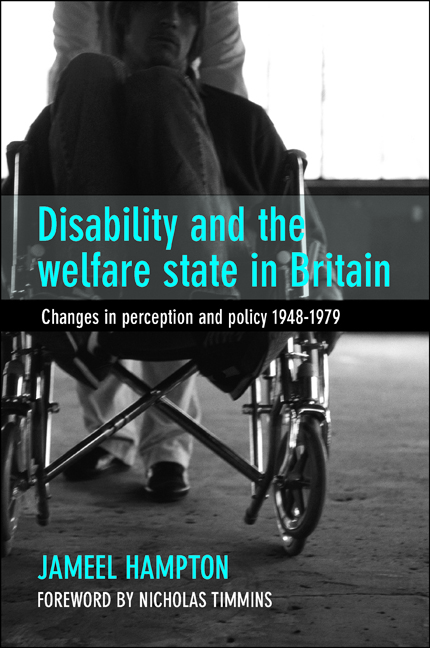Book contents
- Frontmatter
- Contents
- List of tables
- List of acronyms
- About the author
- Acknowledgements
- one Introduction
- two The old regime: provision for disabled people before the welfare state
- three Promotional welfare, 1948–63
- four The emergence of disabled people, 1964–69
- five Cinderella of the welfare state: legislation for disabled people, 1970–72
- six The final days: disability at the end of the welfare state, 1973–79
- seven The last waltz: epilogue
- eight Conclusions
- Appendix: Ministerial periods of office
- Bibliography
- Index
- Frontmatter
- Contents
- List of tables
- List of acronyms
- About the author
- Acknowledgements
- one Introduction
- two The old regime: provision for disabled people before the welfare state
- three Promotional welfare, 1948–63
- four The emergence of disabled people, 1964–69
- five Cinderella of the welfare state: legislation for disabled people, 1970–72
- six The final days: disability at the end of the welfare state, 1973–79
- seven The last waltz: epilogue
- eight Conclusions
- Appendix: Ministerial periods of office
- Bibliography
- Index
Summary
‘It is an ambiguous coincidence that as the International Year of Disabled People is being launched that the Elephant Man should be running so well in London and New York on the stage as well as the screen’, wrote George Hill in 1981. ‘The half-forgotten story of the short life of John Merrick, grotesquely deformed by rare bone disease, is enjoying a minor vogue today, as expressed in books and even t-shirts. If we are less rejecting in our attitudes than the Victorians it is a matter of degree not of kind.’ The welfare state in Britain began to dissolve with the economic crises of the mid-1970s, when the Labour government of the time abandoned full employment (the basis of the welfare state settlement 1943–48), approached the International Monetary Fund (IMF) for a loan in 1976, and imposed strict cash limits on social expenditure. With its victory in the 1979 General Election, the Conservative Party returned to power, but this time as its alter ego that had been dormant for the three decades after the Second World War. Margaret Thatcher's government was openly committed to inequality in its rejection of the collectivist consensus of the welfare state, and marginalisation and poverty for those unable to compete was again a success, and not a failure. The welfare state did seem to promise equality and has often been judged on the equality it created, both generally and for particular groups. There was much redistribution of wealth and power, and improved living standards for many, including traditionally disadvantaged groups such as needy children and poor older people. By 1981, however, it was recognised that the supposedly cradle-to-grave welfare state had actually failed millions of disabled people, not least in respect and acceptance from exclusion. How did it come to this? How did the perceptions of disabled people change? And how did policies for disabled people develop? Why were disabled people ‘the wretched’ of the welfare state?
This book answers these questions. It is the first to contextualise historically disability in the welfare state, and under each government of the period 1948–79. It adds disability policy to our knowledge on the Labour and Conservative Parties, media and advocacy, as well as the Trades Unions Congress (TUC), and provides the first major analysis of the Disablement Income Group (DIG), one of the most powerful pressure groups in the 1960s.
- Type
- Chapter
- Information
- Disability and the Welfare State in BritainChanges in Perception and Policy 1948-79, pp. 1 - 20Publisher: Bristol University PressPrint publication year: 2016



